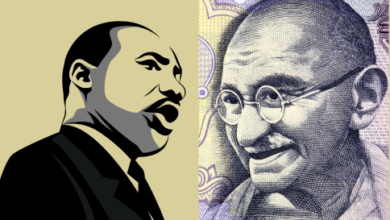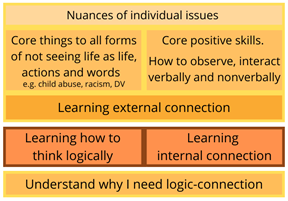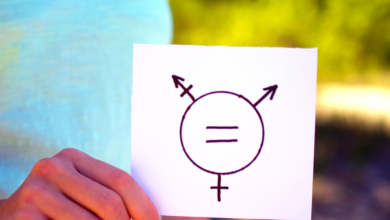These days the expression ‘white privilege’ is becoming more prevalent. Unfortunately, it is used more and more as a means to divide us. One narrative that has gained popularity, especially since 2016 with the Trump campaign, is that white privilege is a myth and in reality it is white people that are most discriminated against. A Pew Research poll done a few years ago shows that a majority of white people in the U.S. believe that as a group, white Americans experience racism. According to the poll 55% of white Americans believe there is discrimination against white people in America today. In order to muddy the waters, the narrative takes concepts like ‘racism’, ‘racist’ and ‘white privilege’ and uses them as if they are identical which makes it difficult to have a discussion around the idea of white privilege and its role in racial inequities.
This is especially true for white people who have grown up in poverty. They had to struggle and work hard for everything. For them the concept of being privileged in any way is absurd. There is also the messaging from the right that suggests people who work towards racial equity and justice believe you are racist because of your white privilege. We have to be very clear and forceful in our discussions about white privilege understanding that recognizing it is not racist. We are not racist because we recognize that white privilege exists. White privilege didn’t cause racism, it is a result of racism. The journal Organizational Behavior and Human Decision Processes, defines white privilege as “economic and social advantages white people experience due to their race that racial minorities do not experience.”
In his article What Is White Privilege, Really?, Cory Collins says recognizing white privilege begins with truly understanding the term itself.
“In that way, white privilege is not just the power to find what you need in a convenience store or to move through the world without your race defining your interactions. It’s not just the subconscious comfort of seeing a world that serves you as normal. It’s also the power to remain silent in the face of racial inequity. It’s the power to weigh the need for protest or confrontation against the discomfort or inconvenience of speaking up. It’s getting to choose when and where you want to take a stand. It’s knowing that you and your humanity are safe.”
I have been an activist for justice for most of my life. I think I was 14 when I went to my first civil rights march. Over the years I have been somewhat successful. At 34 I was elected president of a large state employee union. I was an executive in corporate America and helped found a company. I was the head of a faith social justice organization and co-founded both the Global Catholic Climate Movement and the Faithful Democracy Coalition. Over the years I have taken the time to reflect on how my life evolved. I, as well as my siblings, could easily be the poster boys for the Horatio Algers story. My parents were Irish Catholic immigrants who came to America in 1950. They were dirt poor, had no real job skills and while they spoke English it was with such a thick Irish brogue you would not understand a word they said. I grew up mostly in a transitional neighborhood that was poor Irish but changing to Black and Hispanic. I started working when I was 10 delivering newspapers, caddying, cutting grass and doing whatever other odd jobs I could find. When I graduated high school I got a job and attended Community College at night. So it would be easy for me to say that I started from nothing and because of my hard work became a success. I certainly didn’t feel like I was privileged. Many people believe that acknowledging white privilege will diminish or demean their accomplishments.
In 1972 after graduating from high school I got a job working in a factory where my mother, three of my brothers, two aunts, an uncle and a cousin also all worked. It was considered a good place to be employed. They paid well, had good benefits and generally treated the employees well. The factory complex consisted of numerous buildings covering several blocks all connected by underground tunnels. The workforce was very diverse, consisting of recent immigrants like my mom and aunts, older predominantly white men most of whom were veterans from either the Korean war or WWII, a growing number of younger African American men and Hispanics mostly from Puerto Rico and Mexico. It was what is often characterized as a melting pot of America. My job was working in the shipping room.
Every few days I had to make the rounds to all the different departments to see what orders were ready to be shipped. I became friends with a young black man who was a few years older than me and had a lifetime of experience. We both had grown up in poor neighborhoods. Kevin and I would often talk about political issues. He was one of the few folks who, like me, openly opposed the Vietnam War. But we did so for different reasons. Racism often was a topic of our discussions.
Though the expression “white privilege” was not commonly used at this time Kevin would often say I didn’t really understand racism because I had the advantage of being white. I argued back that I grew up as the son of poor immigrants. I was working in the same factory doing the same job he was. How was I advantaged? Kevin replied when you make your rounds this morning take a second in each department and see if you notice anything. Later on, after I finished my rounds, Kevin asked me if I noticed anything. I said “no nothing out of the ordinary, what was I supposed to be looking for?” Kevin replied, “did you notice how there is not a single black supervisor in any department?’ I hadn’t noticed.
When I thought about that I remembered when I was six and John Kennedy was running for president. My dad took me to see him when he was coming through our town. After giving his speech Kennedy went around shaking hands. He came to my father and heard his thick Irish brogue. He asked my dad what part of Ireland he was from. Kennedy then bent down and said to me that his family had come from Ireland with nothing and today he is running for president so maybe someday I also could run for president. I thought about that moment in relation to my friend Kevin.
I grew up dreaming that some day I could be president and Kevin couldn’t even dream that someday he could be a floor supervisor in a factory. Those white male supervisors didn’t actually do anything wrong. As far as I can remember none of them were overtly racist. They didn’t create the system. They were all very hard working and dedicated folks. When the chance came to get promoted they, like any of us would have, jumped at the opportunity.
When my oldest brother Tom was 19 he joined the Navy. He served his four years and when he got out he was able to take advantage of the GI Bill to attend college. Tom ended up getting a PhD. He went on to get a good job, start a family and buy a house. Tom was three when he came to America with our parents. They came with nothing, no money, no education and little job skills. My brother’s story was one of those American success stories. It even carried on to the next generation. He helped his two daughters get through college and both earned PhDs.
The GI Bill passed in June 1944.The sweeping bill promised prosperity to veterans. It provided subsidies for housing and education. It even gave returning service men and women a cash payment of $100 per month to help with the transition. It is a great program that says thank you to our men and women who served. But when it was first started it excluded black servicemen and women for the most part. An entire generation of men and women who bravely fought to defend our nation were denied the opportunity to get an education and buy a house so they could start accumulating wealth. My brother had to work really hard to accomplish what he has accomplished. It doesn’t lessen his accomplishments to acknowledge that by being white he had an advantage.
About 20 years ago my wife and I made a decision to become foster parents. We ended up adopting the brother and sister who had been staying with us. So we now had two white children and two black children. Being a father of two black children gave me a whole different perspective on white privilege. I remember when my son was 12, he attended a Catholic school that was mostly white. One day a couple of his friends, who are white, were over playing. One of them said to me: “You know Mr. C. we know that we can fool around in class and Delvon (my son) will get blamed for it.” At 12 they understood the concept of white privilege. Another time when Delvon was around 13 he was shopping with his mom. Stella would be going to different departments while Delvon would stop to look at something then realize that his mom was not right there. So, he would look around and then try to catch up. He noticed a person was following him. He was then stopped and confronted by security. They wanted to know why he was following Stella and accused him of following her so he could rob her. That never would have happened if it was one of our white children.
As a white male acknowledging that I had an advantage does not take away from my accomplishments. I still had to work hard and sacrifice. White privilege is not about blaming white people for the advantages they have. It should be about recognizing privilege and understanding that some people have to work much harder just to experience the things that I can take for granted. The writer, activist and founder of the Intersectional Environmentalist, Leah Thomas, wrote in her book The Intersectional Environmentalist: How to Dismantle Systems of Oppression to Protect People + Planet”:
“ACKNOWLEDGING WHICH aspects of your life and identity may have led to advantages (or disadvantages) doesn’t make you a “bad person.” Recognizing privilege isn’t meant to shame you, make you feel bad, or suggest that you’ve had an easy life. However, the process allows the veil of denial to be lifted in order to reveal a pathway toward more understanding, empathy, and equity. Understanding privilege isn’t cut-and-dried. Even as a Black woman, I’m able to look at my childhood and see areas in my life that helped me get where I am today.”





